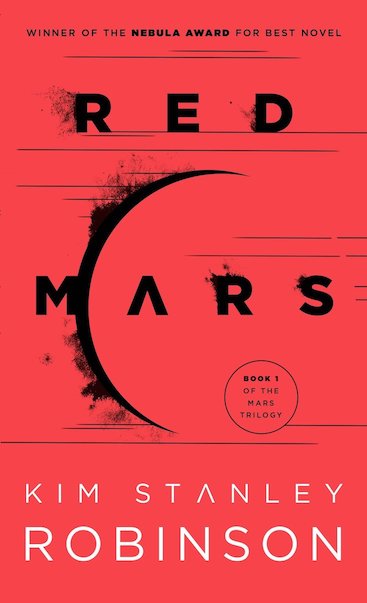
Red Mars is not a perfect book — but its ambition is astounding, and it made me think hard about things down here on earth (the way the very best sci-fi does).
A few months ago, I assigned myself some serious science fiction reading: Kim Stanley Robinson’s Mars Trilogy. I’ve read a bit of KSR’s work before, and found it thought-provoking in the best ways. I hoped that his Mars trilogy would likewise make me think hard about things. I’m only through the first book, but I can say: so far, it has lived up to that hope.
Red Mars is not a perfect book. It is probably a hundred pages too long; it occasionally felt ponderous. Its characters are sharply drawn and memorable, though, and the ambition of the thing is astounding — I several times caught myself thinking just how difficult KSR’s task was in plotting something at this scale and making it make sense — but the plot itself doesn’t really catch fire and move until the last hundred pages or so. Everything before that has some interest, but it didn’t grab me. I had to make myself finish the book last week.
But did it ever make me think and feel. It did what a genuinely good book can do: redraw the world in a small way. I came away from this first book in the trilogy already mulling on Mars in a new way. KSR made me feel the possible costs of terraforming in ways no other novel ever has. Most other books I’ve read take the process for granted, or take the task for the backdrop of some other schemes. Here, it is the central concern. Everything turns on it in some way. The climax of the book is Noachian (a word that appears often in the text in reference to an earlier geological — or in this case areological — age). And that climax is one of destruction wrought by human folly no less than the Biblical narrative it echoes.
It is no secret that KSR has an agenda — call it ecological or environmental or whatever you like; clearly the ruin we have wrought and continue to wreak on the world around us grieves him, and no few of his books are dedicated to that theme. In the strange way that science fiction works, his picture of Mars — red Mars, so unlike Earth in so many ways, but so like Earth in others — provoked thought and feeling for this our own planet in ways few other books have.
Red Mars is a genuine work of not merely scientific but moral imagination, and if the conclusions it draws sorrow me (and I hope — but do not expect — that we do better than it prophesies), I am glad it exists. I am glad to have read it. I wish it were 100 pages shorter. But I am glad to have been stretched by it a bit.